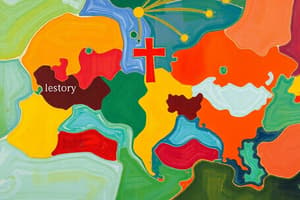Podcast
Questions and Answers
What defines prehistory?
What defines prehistory?
- Era of modern scientific achievements
- Time before the invention of writing (correct)
- Characterized by the spread of Christianity
- Period after writing was invented
Which civilizations are included in ancient history?
Which civilizations are included in ancient history?
- Egypt and Mesopotamia (correct)
- Greece and Rome
- Byzantine and Ottoman
- France and England
What characterizes the Middle Ages?
What characterizes the Middle Ages?
- Focus on philosophical advancements
- Spread of Christianity and feudalism (correct)
- Cultural revival in the arts and sciences
- Emergence of modern nation-states
What is the primary focus of social history?
What is the primary focus of social history?
What is considered a primary source in historical studies?
What is considered a primary source in historical studies?
Which period is known for a cultural revival in Europe?
Which period is known for a cultural revival in Europe?
Who is referred to as the 'Father of History'?
Who is referred to as the 'Father of History'?
What is historiography?
What is historiography?
Flashcards are hidden until you start studying
Study Notes
Definition of History
- The study of past events, particularly human affairs.
- Involves analysis of sources such as documents, artifacts, and oral histories.
Importance of History
- Understanding human behavior and societal development.
- Helps in learning from past mistakes to inform present choices.
Major Periods in History
-
Prehistory
- Time before the invention of writing.
- Divided into the Stone Age, Bronze Age, and Iron Age.
-
Ancient History
- Begins around 3000 BCE with the advent of writing.
- Includes civilizations like Egypt, Mesopotamia, Indus Valley, and China.
-
Classical Antiquity
- Focus on the empires of Greece and Rome (c. 800 BCE - 500 CE).
- Rise of philosophy, democracy, and the arts.
-
Middle Ages
- Also known as the Medieval period (c. 500 - 1500 CE).
- Characterized by feudalism, the spread of Christianity, and the Islamic Golden Age.
-
Renaissance and Early Modern Period
- A cultural revival in Europe (14th - 17th centuries).
- Advances in art, science, and exploration.
-
Modern History
- Begins around the late 18th century to present.
- Includes events like the Industrial Revolution, World Wars, and the Cold War.
Historical Methods
- Primary Sources: Original documents and artifacts from the period being studied.
- Secondary Sources: Analyses or interpretations based on primary sources.
Key Concepts
- Chronology: The arrangement of events in the order of their occurrence.
- Historiography: The study of historical writing and perspectives.
- Contextualization: Understanding the social, economic, and political context of events.
Influential Historians
- Herodotus: Often referred to as the "Father of History."
- Thucydides: Focused on political and military history.
- Karl Marx: Provided a socio-economic interpretation of history.
Theoretical Approaches
- Political History: Examination of political events, movements, leaders, and institutions.
- Social History: Focus on everyday life, societal norms, and cultural practices.
- Economic History: Study of economic systems and practices through time.
Challenges in History
- Bias in sources: Recognition and criticism of differing perspectives.
- Interpretation of events can vary depending on the historian's background.
Modern History Trends
- Increasing use of technology in historical research (digital humanities).
- Interdisciplinary approaches combining sociology, anthropology, and economics with history.
Definition of History
- History involves the study of the past, particularly human affairs.
- It examines sources like documents, artifacts, and oral histories.
Importance of History
- Understanding human behavior and societal development can be learned from history.
- History helps us learn from past mistakes to inform present choices.
Major Periods in History
-
Prehistory is the time before the invention of writing.
- It is divided into the Stone Age, Bronze Age, and Iron Age.
-
Ancient History begins around 3000 BCE with the advent of writing.
- It includes civilizations such as Egypt, Mesopotamia, Indus Valley, and China.
-
Classical Antiquity focuses on the empires of Greece and Rome (c. 800 BCE - 500 CE).
- It is the era that saw the rise of philosophy, democracy, and the arts.
-
Middle Ages, also known as the Medieval period (c. 500 - 1500 CE).
- It is characterized by feudalism, the spread of Christianity, and the Islamic Golden Age.
-
Renaissance and Early Modern Period is a cultural revival in Europe (14th - 17th centuries).
- It saw advances in art, science, and exploration.
-
Modern History begins around the late 18th century and continues to the present.
- It includes events like the Industrial Revolution, World Wars, and the Cold War.
Historical Methods
- Primary Sources are original documents and artifacts from the period being studied.
- Secondary Sources are analyses or interpretations based on primary sources.
Key Concepts
- Chronology is the arrangement of events in the order of their occurrence.
- Historiography is the study of historical writing and perspectives.
- Contextualization is understanding the social, economic, and political context of events.
Influential Historians
- Herodotus is often referred to as the "Father of History."
- Thucydides focused on political and military history.
- Karl Marx provided a socio-economic interpretation of history.
Theoretical Approaches
- Political History examines political events, movements, leaders, and institutions.
- Social History focuses on everyday life, societal norms, and cultural practices.
- Economic History studies economic systems and practices through time.
Challenges in History
- Bias in sources is a challenge because differing perspectives exist.
- Interpretation of events can vary depending on the historian's background.
Modern History Trends
- Technology is increasingly being used in historical research (Digital Humanities).
- Interdisciplinary approaches combine sociology, anthropology, and economics with history.
Studying That Suits You
Use AI to generate personalized quizzes and flashcards to suit your learning preferences.



